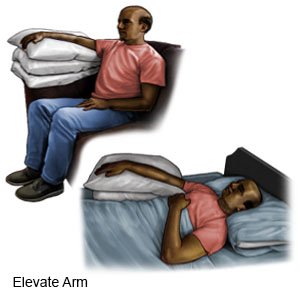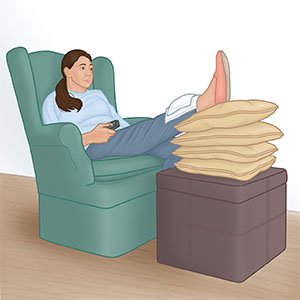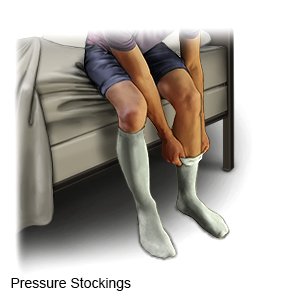Edema
Medically reviewed by Drugs.com. Last updated on Apr 6, 2025.
Edema is swelling throughout your body. Edema is usually a sign that you are retaining fluid. The swelling may be caused by heart failure or kidney, thyroid, or liver disease. It may also be caused by medicines such as antidepressants, blood pressure medicines, or hormones. Sudden swelling around the lips or face may be a sign of a severe allergic reaction. Swelling of an arm or leg may be caused by blockage of your veins.
DISCHARGE INSTRUCTIONS:
Return to the emergency department if:
- You have shortness of breath at rest, especially when you lie down.
- You cough up pink, foamy sputum.
- You have chest pain.
- Your heartbeat is fast or uneven.
Call your doctor if:
- The swollen area feels cold and is pale or blue in color.
- The swollen area feels warm, painful, and is red in color.
- You have increased swelling or swelling in other parts of your body.
- You have questions or concerns about your condition or care.
Medicines:
- Medicines help to get rid of extra body fluid.
- Take your medicine as directed. Contact your healthcare provider if you think your medicine is not helping or if you have side effects. Tell your provider if you are allergic to any medicine. Keep a list of the medicines, vitamins, and herbs you take. Include the amounts, and when and why you take them. Bring the list or the pill bottles to follow-up visits. Carry your medicine list with you in case of an emergency.
Manage edema:
- Elevate your arms or legs as directed. Raise them above the level of your heart as often as you can. This will help decrease swelling and pain. Prop them on pillows or blankets to keep them elevated comfortably.


- Wear pressure stockings as directed. The stockings are tight and put pressure on your legs. This helps to keep fluid from collecting in your legs or ankles.

- Limit your salt intake. Salt causes your body to hold water. Ask about any other changes to your diet.

- Stay active. Do not stand or sit for long periods of time. Ask your healthcare provider about the best exercise plan for you.

- Keep your skin moist using lotion, cream, or ointment. Ask your healthcare provider what to use and how often to use it.
Treatment options
The following list of medications are related to or used in the treatment of this condition.
Follow up with your doctor as directed:
Write down your questions so you remember to ask them during your visits.
© Copyright Merative 2025 Information is for End User's use only and may not be sold, redistributed or otherwise used for commercial purposes.
The above information is an educational aid only. It is not intended as medical advice for individual conditions or treatments. Talk to your doctor, nurse or pharmacist before following any medical regimen to see if it is safe and effective for you.
Learn more about Edema
Treatment options
Care guides
Symptoms and treatments
Further information
Always consult your healthcare provider to ensure the information displayed on this page applies to your personal circumstances.
